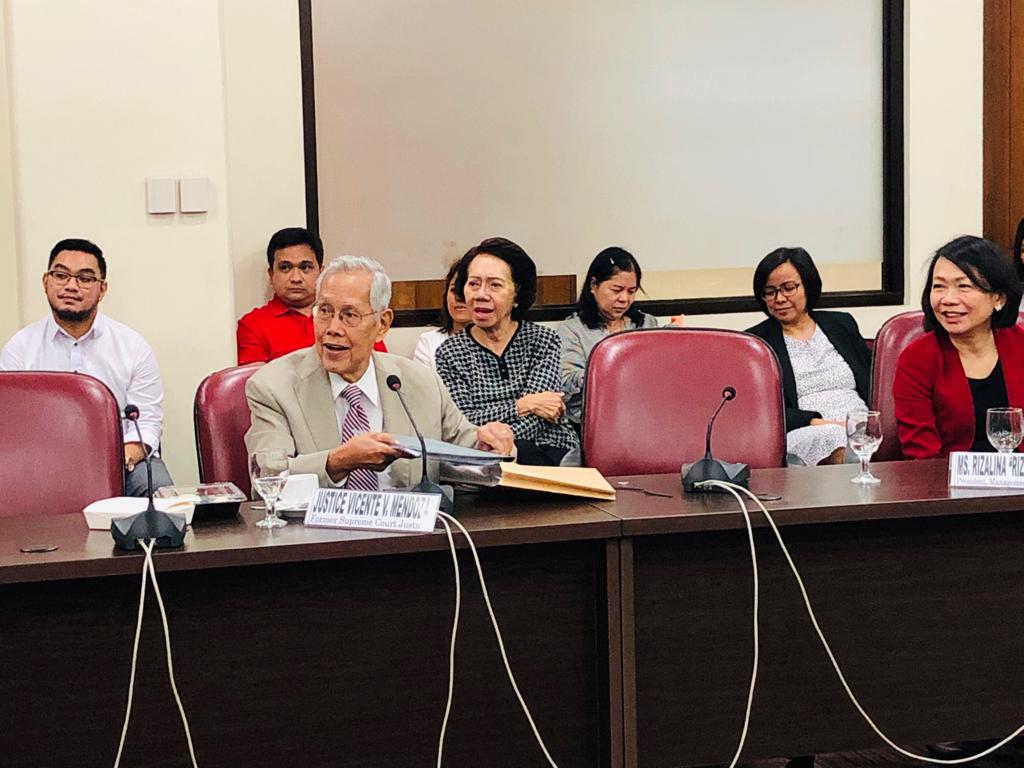
Retired Supreme Court Justice Vicente Mendoza appears before the House panel on constitutional amendments. Photo by Gabriel Pabico Lalu/ INQUIRER.net
MANILA, Philippines – A former Supreme Court (SC) justice has asked the House of Representatives to drop the words ‘federal’ in the proposed constitution, as the charter is just a decentralized unitary form of government.
According to retired Justice Vicente Mendoza on Wednesday, he likes the proposal as it does not advocate for federalism, which he believes would only fragment the provinces and regions further.
“I noticed that this is not really a federal system. And I like it, I was opposed to previous proposals for a change or revision of the Constitution, to shift to a federal system, but this one is a more decentralized unitary system of government,” Mendoza told the House panel on constitutional amendments.
“The dream of unifying the country is illusory because as I said, federalization is an organizing principle to unite the sparring independent units. But the truth is, for more than 50 years, we have labored towards unity […] and now we want to amend that and fragment a state?” he asked.
Mendoza, who was invited by the panel to share his thoughts on the proposed charter, said the autonomy given to the federal regions does not even exceed those given to the now-existing Bangsamoro Autonomous Region in Muslim Mindanao (BARMM).
“It’s autonomy is even less, so in my opinion, the regions are not even comparable in autonomy,” he explained.
Joint Resolution No. 1 is a consolidated proposal to amend the 1987 Constitution and change the style of government from unitary-presidential style to federal. This was one of President Rodrigo Duterte’s advocacies before he ran for president in 2016.
Duterte, a member of the ruling PDP-Laban party which pushes for federalism, said this form of government will bring progress to provinces supposedly neglected by national government agencies. Just recently though, he conceded that the change might not be possible under his time.
READ: Duterte looking to destroy ‘Imperial Manila’
READ: Duterte’s pivot to Davao, away from ‘Imperial Manila’
READ: Duterte leaves federalism to next President
Under the proposal introduced by committee chair and Cagayan de Oro 2nd District Rep. Rufus Rodriguez, there would be 18 federated regions which will be given ‘independence’ by the national government.
However, Mendoza said these supposed ‘federated’ regions should not be called as such, especially since they do not even have a police force of their own — unlike in the proposals regarding BARMM where a police commission will be created.
He also urged people to stop looking at the geographical divisions as a basis for federalism, noting that some provinces and regions may not be able to sustain growth on their own if given autonomy.
“Imagine, the southern regions according to studies contribute only less than one percent of the gross national product, whereas Metro Manila which accounts for less number of people, accounts for 26.4 percent of the GDP. Metro Manila will resent sending its resources to the south, there will be resentment,” Mendoza warned.
“You are only going to emphasize the division between the regions, stress this and make them look less independent states, when the reality is they cannot economically have their own profit,” he added.
During the house panel hearing, different resource persons with various viewpoints on the constitutional issue were invited to talk, including lawyer Neri Colmenares, Interior Assistant Secretary Jonathan Malaya, and professors Ranjit Rye and Edmund Tayao.
Colmenares earlier denounced the proposed charter, saying that it gives the president martial law-like powers in case a federal region or province fails to fulfill its mandate. /muf
READ: Federal charter gives president ‘martial law powers’ over regions — Colmenares